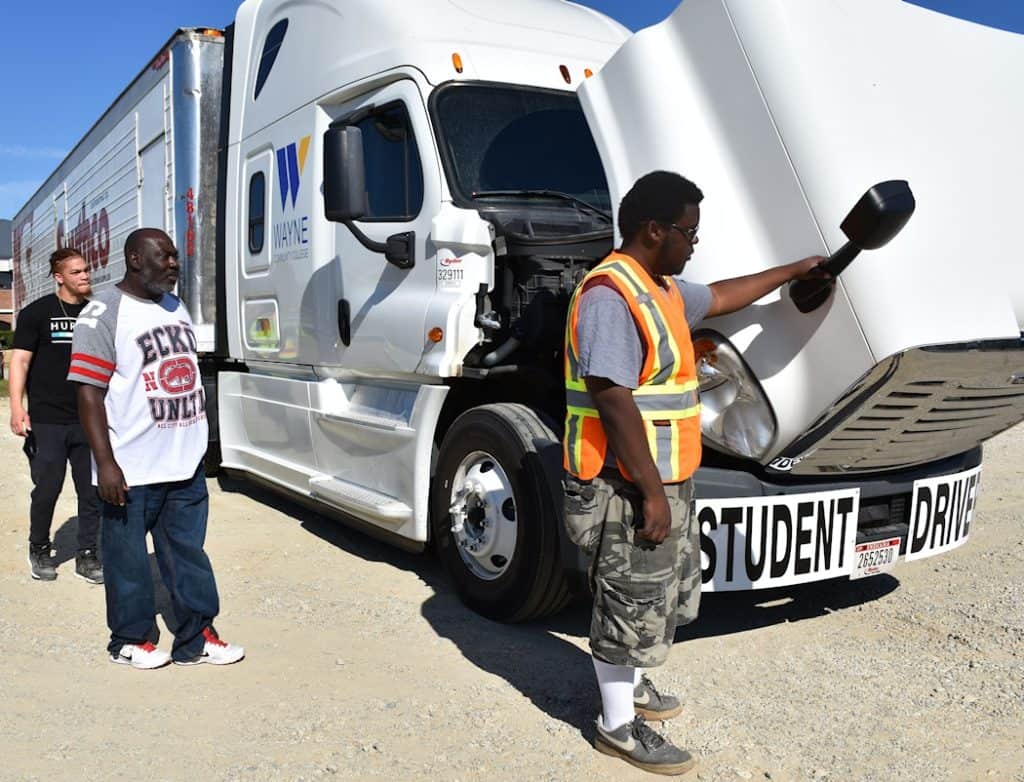As always, the short answer is it depends. It’s a great career choice if you enjoy being on the road and want to see different parts of the country. However, it’s important to know that becoming a truck driver is not always an easy job and sometimes requires a lot of time, patience and hard work.

In a rapidly changing world, the demand for truck drivers is consistently growing. Becoming a truck driver is a career path filled with opportunities and challenges. But is it right for you? This comprehensive article will explore all the facets of becoming a truck driver and help you make an informed decision.
The open road, the freedom of the highways, and the allure of a truck driver’s lifestyle have long captivated the imagination of many individuals. The prospect of traveling across the country, seeing new places, and enjoying a unique sense of independence can be enticing. However, before you set your sights on a career as a truck driver, it’s essential to consider whether this profession is truly right for you. In this blog, we’ll delve into the key aspects of becoming a truck driver, the challenges and rewards it entails, and how to determine if it aligns with your personal and professional goals.
- The Life of a Truck Driver
Being a truck driver is more than just driving a large vehicle from point A to point B. It’s a lifestyle that involves long hours on the road, extended periods away from home, and constant adaptability to changing schedules and weather conditions. Truck drivers often work irregular hours and may spend days or even weeks away from their families. This level of dedication to the job can be both fulfilling and challenging, depending on individual preferences and priorities.
- Training and Licensing
Before pursuing a career as a truck driver, it’s crucial to undergo proper training and acquire the necessary licenses. Most countries require commercial driver’s license (CDL) training, which involves a combination of classroom instruction and hands-on driving experience. Training programs vary in length and intensity, so prospective truck drivers must be committed to the learning process and dedicated to mastering the skills required for safe and efficient driving.
- Physical and Mental Demands
Driving a truck for extended periods can take a toll on both the body and mind. Sitting for long hours and dealing with the stress of navigating through traffic and inclement weather conditions can lead to physical discomfort and fatigue. Additionally, staying alert and maintaining focus on long stretches of highway is essential for safety. Prospective truck drivers should assess their physical fitness, mental resilience, and ability to adapt to various challenges that may arise on the road.
- Work-Life Balance
As mentioned earlier, truck driving often involves significant time away from home and loved ones. For some individuals, the solitude and freedom of the road are appealing, while others may struggle with the separation from their families. Before committing to this career path, consider how important work-life balance is to you and your loved ones, as truck driving may impact personal relationships and social life.
- Salary and Job Stability
The financial aspect of a truck driving career is another crucial factor to ponder. While some truck drivers can earn competitive salaries, especially with experience and specialized endorsements, others may find that compensation varies depending on the type of cargo they transport and the routes they take. Moreover, technological advancements, such as autonomous vehicles, may potentially impact job stability in the long run. It’s essential to research the current job market and future prospects before deciding to become a truck driver.
Is Truck Driving a Career for You?

Becoming a truck driver can be a rewarding and fulfilling career choice for individuals who are passionate about driving, exploring new places, and embracing the nomadic lifestyle. However, it also comes with its share of challenges, including time away from home, physical demands, and uncertainties in the job market. Before embarking on this journey, carefully assess your personal preferences, family commitments, and long-term goals to determine if truck driving aligns with your aspirations.
If you’re ready to embrace the open road and are prepared to face the rigors of this profession, truck driving can offer a unique and adventurous career path that allows you to see the world from behind the wheel. Remember, making an informed decision is key to finding a career that brings you fulfillment and satisfaction.
Where to Get Your Commercial Driver’s License

First, you’ll need to obtain a commercial driver’s license (CDL) (See our beginner’s guide) which is required to operate a commercial motor vehicle (CMV). To get a CDL, you’ll need to pass a series of written and driving tests. You will also need to meet certain physical and medical requirements, such as passing a physical examination and having good vision and hearing.
Once you have your CDL, you’ll need to find a trucking company that is willing to hire you and provide you with on-the-job training. This can take some time, so be prepared to be patient and persistent.
Some companies have paid training (even to get your CDL) You can research them, a few are listed below.
- Schneider National:
- Website: https://schneider.com/
- Phone number: 1-800-558-6767
- Email: info@schneider.com
- Swift Transportation:
-
- Website: https://www.swifttrans.com/
- Phone number: 1-800-800-2200
- Email: info@swifttrans.com
-
- CR England:
- Website: https://www.crengland.com/
- Phone number: 1-800-453-8826
- Email: info@crengland.com
- Roehl Transport:
- Website: https://www.roehl.jobs/
- Phone number: 1-800-535-0269
- Email: info@roehl.net
- Prime Inc:
- Website: https://www.primeinc.com/
- Phone number: 1-800-848-4560
- Email: info@primeinc.com
- Werner Enterprises:
- Website: https://www.werner.com/
- Phone number: 1-800-228-2240
- Email: info@werner.com
- TMC Transportation:
- Website: https://www.tmctrans.com/
- Phone number: 1-800-654-8518
- Email: info@tmctrans.com
- US Xpress:
- Website: https://www.usxpress.com/
- Phone number: 1-866-576-2979
- Email: info@usxpress.com
- PAM Transport:
- Website: https://pamtransport.com/
- Phone number: 1-800-698-3276
- Email: info@pamtransport.com
- Covenant Transport:
- Website: https://www.covenanttransport.com/
- Phone number: 1-888-368-6145
- Email: info@covenanttransport.com
- Maverick Transportation:
- Website: https://www.maverickusa.com/
- Phone number: 1-800-289-1100
- Email: info@maverickusa.com
- Heartland Express:
- Website: https://www.heartlandexpress.com/
- Phone number: 1-800-441-4953
- Email: info@heartlandexpress.com
- J.B. Hunt:
- Website: https://www.jbhunt.com/
- Phone number: 1-800-452-4868
- Email: info@jbhunt.com
- TransAm Trucking:
- Website: https://www.transamtruck.com/
- Phone number: 1-913-782-5300
- Email: info@transamtruck.com
- Knight Transportation:
- Website: https://www.knighttrans.com/
- Phone number: 1-888-394-4197
- Email: info@knighttrans.com
It’s important to note that these are just a few examples and there are many more trucking companies that offer in-house training programs. It’s also important to research and compare different training programs before making a decision. Some companies may discontinue paid training from time to time
The life of a truck driver can be challenging, as you’ll be spending long hours on the road, sometimes away from home for days or weeks at a time. It can be difficult to maintain relationships and a normal routine. However, if you’re self-motivated and enjoy travel and the freedom of the open road, it can be a very satisfying and rewarding career.
You will also need good time management skills and be able to plan your routes and deliveries efficiently. The job will also have physical demands, such as basic vehicle maintenance along with loading and unloading cargo.
Overall, becoming a truck driver is a big decision, and it’s important to weigh the pros and cons before making your choice. If you’re up for the challenge and ready for an exciting career on the road, then truck driving may be the perfect fit for you.
Becoming a Truck Driver: Qualifications for Company Paid CDL Training
The qualifications for company-paid CDL training can vary depending on the trucking company. However, some general qualifications that are often required include:
A valid driver’s license: You will typically need to have a valid driver’s license and a good driving record to be considered for company-paid CDL training.
Age: You will typically need to be at least 21 years of age to be eligible for company-paid CDL training, as federal regulations require commercial drivers to be at least 21 years old to operate a commercial motor vehicle across state lines.
Education: Some trucking companies may require a high school diploma or equivalent, while others may not have any educational requirements.
Physical and medical requirements: You will need to pass a physical examination and meet certain medical standards to be eligible for company-paid CDL training. This may include passing a drug test, having good vision and hearing, and being able to pass a Department of Transportation (DOT) physical examination.
Background check: Some trucking companies may require a background check to ensure that you have a clean criminal record and no prior convictions.
Ability to pass a pre-employment test: Some companies may require you to pass a pre-employment test to assess your ability to handle the demands of the job.
It’s important to note that these are general qualifications, and different trucking companies may have different requirements. It’s always best to research and compare the qualifications for different company-paid CDL training programs before making a decision.
FAQs
What qualifications do I need to become a truck driver?
- You typically need a high school diploma or equivalent and must complete a professional training program to obtain the required licenses.
Is truck driving a stable career?
- Yes, the demand for truck drivers is expected to continue growing, providing stable employment opportunities.
How can I determine if truck driving is the right career for me?
- Evaluating your physical and mental fitness, understanding the lifestyle, and talking to experienced drivers can provide insights into whether truck driving is a suitable career path for you.










